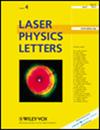Terahertz field generation in a self-sustained magnetic laser-plasma channel
IF 1.4
4区 物理与天体物理
Q3 OPTICS
引用次数: 0
Abstract
We theoretically investigate the terahertz field excitation from a laser-driven self-sustained magnetized plasma channel. The expulsion of plasma electrons by the laser ponderomotive force modifies the plasma density, which self-focuses the laser pulse. For the optimized laser parameters, the laser propagates without diverging in plasma and a plasma channel is created. The magnetic field applied along the laser propagation enhances the channel formation efficiency. We utilize this magnetic plasma channel to excite the transverse radiation field by the self-focused laser via wakefield excitation. The magnetic plasma channel maintains the laser intensity over a larger propagation distance, exciting wakefields efficiently. The second order perturbation technique is applied to calculate the wakefield components excited by the laser pulse in a self-sustained magnetic plasma channel. The density perturbation associated with the low-frequency ponderomotive force derives the transverse nonlinear current at terahertz frequency. Our results show that the magnetic field plasma channel can significantly enhance the terahertz conversion efficiency. The tunable terahertz radiation fields of 20 THz frequency with about 10 GV/m may be obtained using one Tesla magnetic field. The efficiency of the process may be optimized and controlled by the laser and plasma parameters. These high-field THz may be useful in various applications such as ultra-fast technology.在自持磁激光等离子体通道中产生太赫兹场
我们从理论上研究了激光驱动自持磁化等离子体通道的太赫兹场激励。等离子体电子被激光的思动力驱逐,等离子体密度发生改变,从而使激光脉冲自聚焦。在激光参数优化的情况下,激光在等离子体中传播时不会发散,并形成等离子体通道。沿激光传播方向施加的磁场提高了通道形成的效率。我们利用这一磁性等离子体通道,通过唤醒场激发自聚焦激光器的横向辐射场。磁等离子体通道能在更大的传播距离上保持激光强度,从而有效地激发唤醒场。二阶扰动技术用于计算自聚焦磁等离子体通道中激光脉冲激发的唤醒场成分。与低频思索动力相关的密度扰动推导出了太赫兹频率下的横向非线性电流。我们的研究结果表明,磁场等离子体通道能显著提高太赫兹转换效率。使用一个特斯拉磁场可获得频率为 20 太赫兹、约 10 GV/m 的可调太赫兹辐射场。该过程的效率可通过激光和等离子参数进行优化和控制。这些高场太赫兹可用于各种应用,如超高速技术。
本文章由计算机程序翻译,如有差异,请以英文原文为准。
求助全文
约1分钟内获得全文
求助全文
来源期刊

Laser Physics Letters
物理-仪器仪表
CiteScore
3.30
自引率
11.80%
发文量
174
审稿时长
2.4 months
期刊介绍:
Laser Physics Letters encompasses all aspects of laser physics sciences including, inter alia, spectroscopy, quantum electronics, quantum optics, quantum electrodynamics, nonlinear optics, atom optics, quantum computation, quantum information processing and storage, fiber optics and their applications in chemistry, biology, engineering and medicine.
The full list of subject areas covered is as follows:
-physics of lasers-
fibre optics and fibre lasers-
quantum optics and quantum information science-
ultrafast optics and strong-field physics-
nonlinear optics-
physics of cold trapped atoms-
laser methods in chemistry, biology, medicine and ecology-
laser spectroscopy-
novel laser materials and lasers-
optics of nanomaterials-
interaction of laser radiation with matter-
laser interaction with solids-
photonics
 求助内容:
求助内容: 应助结果提醒方式:
应助结果提醒方式:


